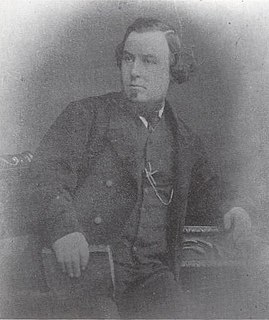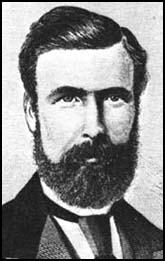Biography
George Potter was born in Kenilworth. [1] He was educated for a short time at a local dame school, but left to work at a young age to supplement his father's income of three shillings a day. He worked as a farm labourer until he was sixteen, when he moved to Coventry where he became an apprentice joiner and cabinet-maker. [2] In 1854 he moved to London to work as a carpenter. [1] [2]

Kenilworth is a town and civil parish in Warwickshire, England, about 6 miles (10 km) south-west of the centre of Coventry, 5 miles (8 km) north of Warwick and 90 miles (140 km) north-west of London. The town is on Finham Brook, a tributary of the River Sowe, which joins the River Avon about 2 miles (3 km) north-east of the town centre. The 2011 Census recorded a parish population of 22,413. Kenilworth is noted for the extensive ruins of Kenilworth Castle. Other sights include the ruins of Kenilworth Abbey in Abbey Fields park, St Nicholas' Parish Church and the town's clock tower.

A dame school was an early form of a private elementary school in English-speaking countries. They were usually taught by women and were often located in the home of the teacher.

Coventry is a city and metropolitan borough in the West Midlands, England.
In London, he joined a small trade union, the Progressive Society of Carpenters and Joiners, to which he was elected secretary in 1854, and chairman in 1858. He believed that progress could be made if all trade unions representing the building trades were united in one society, so in 1859 organised the Building Trades Conference. At the conference, the unions agreed to demand a maximum working day of nine hours from their employers. The employers refused, resulting in strike action and a lockout. Eventually the unions conceded, but due to his actions Potter became a prominent figure in the New Model Unions movement. He was regarded as a more intellectual, 'respectable' trade unionist, due in part to his smart appearance and restrained public speaking style. He was made an executive member of the London Trades Council (LTC).

Strike action, also called labor strike, labour strike, or simply strike, is a work stoppage, caused by the mass refusal of employees to work. A strike usually takes place in response to employee grievances. Strikes became common during the Industrial Revolution, when mass labor became important in factories and mines. In most countries, strike actions were quickly made illegal, as factory owners had far more power than workers. Most Western countries partially legalized striking in the late 19th or early 20th centuries.
A lockout is a temporary work stoppage or denial of employment initiated by the management of a company during a labor dispute. That is different from a strike in which employees refuse to work. It is usually implemented by simply refusing to admit employees onto company premises and may include changing locks and hiring security guards for the premises. Other implementations include a fine for showing up or a simple refusal of clocking in on the time clock. It is therefore referred to as the antithesis of strike.

The London Trades Council was an early labour organisation, uniting London's trade unionists. Its modern successor organisation is the Greater London Association of Trades (Union) Councils
Potter established a weekly trade unionist journal, the Bee-Hive in 1861 edited by the journalist George Troup. It was adopted as the official journal of the LTC, but by 1862 only had a circulation of 2700, while Potter had debts of £827. Some members of the LTC complained that the Bee-Hive gave its support too unreservedly to strike action, with Robert Applegarth accusing Potter of being a "manufacturer of strikes". Potter defended the policy by arguing that each strike had been judged as necessary by a trade union, and therefore deserved the full support of the LTC.
The Bee-Hive was a trade unionist journal published weekly in the United Kingdom between 1861 and 1878.

Robert Applegarth was a prominent British trade unionist and proponent of working class causes.
Applegarth lead an investigation into the Bee-Hive's reporting in 1865, and accused Potter of personal dishonesty and maladministration regarding the journal's coverage of an industrial dispute in North Staffordshire. As a result, the Bee-Hive ceased to be the LTC's official journal and Potter lost his seat on the executive board.

Staffordshire is a landlocked county in the West Midlands of England. It borders with Cheshire to the northwest, Derbyshire and Leicestershire to the east, Warwickshire to the southeast, West Midlands and Worcestershire to the south, and Shropshire to the west.
John Bedford Leno noted that in 1867 Robert Hartwell was the real editor of the Bee-Hive, and that Potter had assumed the credit for it.

John Bedford Leno was a Chartist, radical, poet, and printer who acted as a "bridge" between Chartism and early Labour movements, as well as between the working and ruling classes. He campaigned to give the vote to all common men and women, driven by a strong desire for "justice and freedom for all mankind". He was a leading figure in the Reform League, which campaigned for the Reform Act 1867. He was called the "Burns of Labour" and "the poet of the poor" for his political songs and poems, which were sold widely in penny publications, and recited and sung by workers in Britain, Europe and America. He was an entertaining and persuasive orator and his speeches were in great demand around London. He owned, edited and contributed to Radical and Liberal newspapers and journals, and printed and distributed bills advertising London Reform meetings and demonstrations. He wrote the international hit 'The Song of the Spade'.
Potter went on to establish the London Working Men's Association (LWMA), with the Bee-Hive as its official journal. The journal continued to advocate rights for trade unions and supported the more radical members of the Liberal Party. Potter took up editing of the Bee-Hive, but it sold poorly and he was only saved from bankruptcy when Samuel Morley (a Liberal MP) and Daniel Platt bought up shares in the newspaper in June 1868.
In March 1871 Potter was elected first President of the Trades Union Congress (TUC), and made chairman of the Parliamentary Committee on Trade Unions. He also joined (along with Applegarth and Howell) the Working Men's Committee for Promoting the Separation of Church and State.
In 1873 Potter was elected to the London School Board. [3] He represented Westminster on the school board until 1882, being re-elected on two occasions. [4] [5] At the 1882 school board election he was unseated, coming last of seven candidates. [6] [7]
In 1878 the Bee-Hive was declared bankrupt, with debts of over £2000. Potter attempted to continue his business by publishing political pamphlets and biographies but this too ended in failure.
He twice contested parliamentary elections for the Liberal Party, but failed to win a seat. He was a candidate at Peterborough in 1874 and at Preston in 1886. [1]
On 8 April 1893 Potter took part in a demonstration in Trafalgar Square against the Direct Veto Bill, a piece of proposed legislation controlling the opening hours of public houses. The demonstration descended into violence with police clearing the square. Potter became ill at the event, and never returned to work. He died at his home at Marney Road, Clapham Common from "paralysis of the brain" on 3 June 1893. [1] [2]









